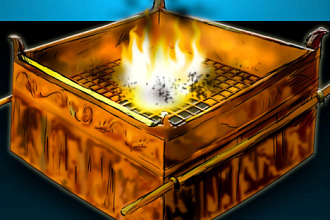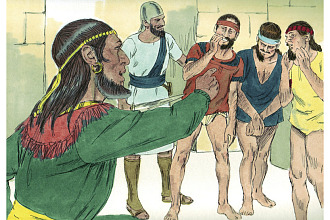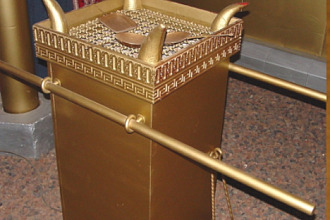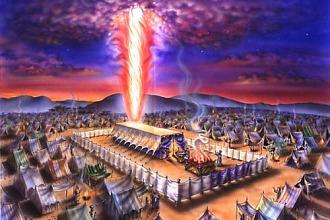Moses went from being self-centered, to non-centered, to God-centered. That is a transition that would be good for all of us to experience. But it does not often come easily. Often it is when we are in the wilderness that we hear God’s voice. What you are experiencing now could be the wilderness where God wants to speak His Words into your heart.
Moses was rejected by Pharaoh and he was also rejected by his own people whom he was trying to help. But other than that suicidal moment, in forty years in the wilderness Moses was not deterred by the reactions of Pharaoh or the people. Because at this point in Moses’ life it really did not matter what he thought or what others thought. The only thing that mattered to Moses was what God thought. And that, my friend, is the key to contentment.
God used Moses to deliver the people out of Egypt, to lead them to Mount Sinai and the presence of God Almighty, and to bring them to the edge of the Promised Land. Yet during the forty years wandering in the wilderness the people seemed to treat Moses with mixed emotions, sometimes following, other times rebelling. Moses’ cousins staged a full-scale rebellion and an attempted coup to replace him. Even his brother and sister, Aaron and Miriam, questioned his leadership and his marital choice. They talked badly about him and to him. All of that pressure and rejection could have easily sent Moses into a depression—but he didn’t go there, except once. Why?
Because he did not take it personally. Moses realized that they were the ones with the problem, not him. Since they were the ones with the problem, he did not pray, “Oh God please help me, no one likes me, everyone is mean to me, this is not fair. God punish them, teach them a lesson. Oh, why me, why me, always me.” Moses did need help, what was happening to him was not fair, the burden was always falling on him, and at that point it seemed that no one loved him. But since he knew they were the ones with the problem, Moses interceded in prayer for God to forgive them and to help them with their problem. Again, he knew who he was in God. That was all that mattered.
It is not wrong to acknowledge that things are not fair and that we are being wronged. But if we stay in that mindset and don’t look above ourselves, we can get stuck there. We don’t want to get stuck there; it is not a happy place to be.
We would think after all Moses did and risked personally for the people they would be eternally grateful to him, but they weren’t. Even his family wasn’t. You may be tempted to get discouraged because your efforts have not been appreciated as they should. People may not always reciprocate positively to all you have done for them. You may think, “After all the diapers I changed…, after all I have done…, after all these years of hard work…, how dare they treat me this way, this is not fair, it is not right.” You are right. It is not fair and it is not right. Unfortunately, sometimes it is what it is.
The reality is that people are jerks—and that includes you and me. People are going to reject us and disappoint us even after “all we have done for them.” We are going to get hurt unjustly. That is the way it is in this world. It is not always intentional, but it does happen and it will continue to happen. This earth is not heaven. We are on our way to heaven. We are just passing through this dark period of earth’s history.
Most of it is not personal. The reality is most of the time people, including you and me, are caught up in themselves and are not thinking about how their actions are affecting others. Yes, there are times when people are just out to get us. They are vengeful, hateful, and mean. But even then it is not because of us they are that way. They were that way before we came on the scene; we just happen to be in the middle of their target practice at the time. If they are rejecting you for no good reason, they are the ones with the problem, not you. God will take care of you. Since they are the ones with the problem, we should be praying like Moses did—for them.
I heard a story about someone who was being verbally abused. He said to the abuser, “If someone offers me a gift and I refuse it, to whom does the gift belong?” The abuser said, “To the one who offered him the gift.” The abused person continued, “The gift of verbal abuse you are offering me, I refuse, thus it is yours.”
As a child I was taught a rhyme, “Sticks and stones will break my bones, but names will never harm me.” I have heard people respond to that by saying, words and name calling do hurt. Yes, but only if we listen to them and allow them to hurt us. We can ignore them. We can refuse the verbal abusive gift and leave it with them. That is what that rhyme was teaching children, choose not to let them harm you.
Another rhyme was, “I am rubber, you are glue, what you say will bounce off me and stick to you.” It really can be that way, if we choose not to accept their verbal abuse. God has given us the amazing power of choice. Exercise it; use it.
In addition to choosing not to listen to people’s negative words, we can also choose to not be around people who continue to try to abuse us with their negative words. Separating yourself from the verbal abuser might be difficult, but it might also be necessary.
Don’t take another’s problems and make it your depression. Leave it with him or her. Trust that God will take care of you. Remember, it is only what God thinks of you that counts, and He loves you. After rejecting to listen to their negative talk, fill your mind with God’s promises. Read His Word, listen to godly music, and repeat Bible promises out loud.
Sometimes God is using these situations for our good and we don’t even know it.
I believe God has a greater good in store for you and me, and no one else can stop that from coming our way. We can blow it and reject what God has in store for us, but no one else can take it from us or stop God from giving it to us. How can we blow it and reject it? Through sin and unbelief. How do we get rid of the sin and unbelief?
- If we confess our sins, He is faithful and just to forgive us of all sins and cleanse us from all unrighteousness (1 John 1:9).
- They overcame him by the blood of the Lamb and the word of their testimony… (Revelation 12:11).
- “Lord, I believe; help my unbelief!” (Mark 9:24).
The formula for getting rid of sin and unbelief in Moses’ day, actually from Adam and Eve until the Messiah, was to confess the sin to God, bring a spotless lamb to the sanctuary, lay your hands upon it, and believe your sin transferred to the lamb. Then you had to cut the lamb’s throat, sacrifice the lamb, and accept its death in place of your death. The lamb received your punishment on your behalf.
That was pretty horrible for the lambs, but it shows us how horrible sin is and how sin affects God Himself, for He became the Lamb of God who takes away the sin of the world. After you sacrificed the lamb, God accepted the substitute and you were forgiven. At that point you could ask God to give you faith and power not to do it again.
Today it is similar, only that we accept the Messiah’s sacrifice on our behalf instead of sacrificing our own lambs.
Pause, Ponder, and Proceed:
Today is your life more self-centered, non-centered, or God - centered?
1. If you could not honestly say God-centered, pause right now in your own quiet “wilderness” and ask God to reveal Himself to you and to re-center your life. (Brace yourself, it might mean a Moses experience awaits you, but it will be worth it.)
2. Say out loud, “I choose to accept that in this life, on this earth, there will be ups and downs, and I choose to accept God’s care for me in spite of the difficulties here. I choose not to accept the negative, hurtful abuse by others. I choose to accept God’s love for me.”
3. If it has upset you that you were not fully appreciated for the good you have done, then choose to be only concerned with the appreciation that God gives, not humans.
4. If your prayers have been more about God helping you than God helping others, ask God to give you His heart and His love for others.
5. Pray for three people, in particular people with issues such as those who have been so wrapped up in themselves that they have not appreciated what you have done for them. (Don’t just pray about them, pray FOR them, for their benefit, for their welfare.)
6. If there is a sin in your life—a known wrong that you consciously and rebelliously hold on to—that is blocking God from being able to truly bless you, ask God to forgive you for that sin. It could be anger, insecurity, fear, bitterness, negativity, being unthankful, grumbling, complaining, or a whole host of other things the Bible speaks out against. After you confess it, accept His forgiveness because of the sacrifice of the Messiah. Then ask Him to fill you with His Spirit to empower you not to fall for those sins again.
Learn more about Moses, and other depressed people of the Bible in the book “Depressed People of the Bible,” available where most books are sold.
Author’s Disclaimer: The information I will be sharing is not intended for diagnosis or treatment of depression. It is a biblical reflection on people throughout the Scriptures who dealt with depression and how God carried them through it to healing and purpose.


























